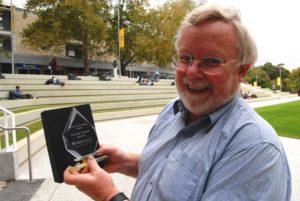
“It’s far more effective to work with people. Psychologists will tell you that if you directly challenge someone, they will often respond negatively.
“I hope that at Flinders I’ve helped train doctors who engage with people at a personal level, because while we might not need to be a friend with a patient, we do need to be an equal.”
He may be retiring after 30 years at Flinders University, but Associate Professor of General Practice John Litt is happy to make time for one more chat about what he’s achieved, and to talk about his hopes for the university’s future GPs.
On his desk stands a Lifetime Achievement Award from The Lung Foundation, presented that morning at a morning tea with his colleagues, which he can add to a Dean’s Award received in 2014 as tangible recognitions of his reputation and standing in South Australia.
Less visible, but perhaps even more impressive is the revelation that in 2015 alone, during his time as Deputy Chairman of the Royal Australian College of General Practitioners Quality Committee, its publications and guidelines have generated more than one million hits.’
Then there’s his key role, together with another public health physician and South Australian GP, Peter Lake, in raising the uptake of flu vaccinations in South Australia for a major risk group, those over 65 years, from 29% to 80+% over a 10 year period.
That was achieved through the formation of the SA Influenza Advisory Committee, which was comprised of a range of interested groups and worked with SA Health to promote influenza vaccination in at risk groups.
It followed a major shortage in 1993 and prompted the Committee to conduct the first National Influenza and Pneumococcal Survey in the elderly in Australia in the late 1990s.
If that isn’t impressive enough, he’s been a member of the SA Department of Health Primary care Pandemic Planning Steering committee and sat on several committees related to immunisation, including the ATAGI, SA Immunisation Forum, SA Influenza and Pneumococcal Advisory Committee.
Given his participation in so many influential bodies dedicated to providing and improving Australian health care, it’s perhaps not surprising that Associate Professor Litt has very clear ideas about how GPs can improve the standard of care they provide.
“What we want to do is teach doctors not just the course content but also how to manage all of the other complex issues faced by their patients as well,” he says.
“We want to teach continuity of care alongside constant self-assessment so that GPs can manage the complex needs of their patients while constantly improving their own skills.
“We also teach motivational interviewing techniques for doctors so that they learn to understand their patients’ needs without making judgements.
“If we can’t understand patients’ problems from their own points of view,” he says, “then I don’t believe we can provide them with the best care.”
As John Litt speaks, one is left in no doubt that he was the right man for the job of Associate Professor of General Practice at Flinders, and that his Dean’s Award was well deserved.
He’s also clearly still passionate about his work, and says it’s been an incredible journey at Flinders; one that started with his own studies here, leading to a role in the Department of Primary Care and Community Medicine, before it changed to the Department of General Practice 15 years ago.
It’s a passion that prompts the question of why he’s not staying on longer, to which he has a profoundly simple, but deeply personal reply.
“My mother always instilled in me that you should leave the party while you’re still having a good time,” he says.
And while the Flinders ‘party’ may technically be over, he says he will remain active on four national and one international Immunisation Advisory Committees.
“As Dylan Thomas once wrote: ‘Do not go gentle into that good night, Old age should burn and rave at close of day; Rage, rage against the dying of the light’.
“I suppose you could say I’m taking my mother and Dylan Thomas’s advice.”

